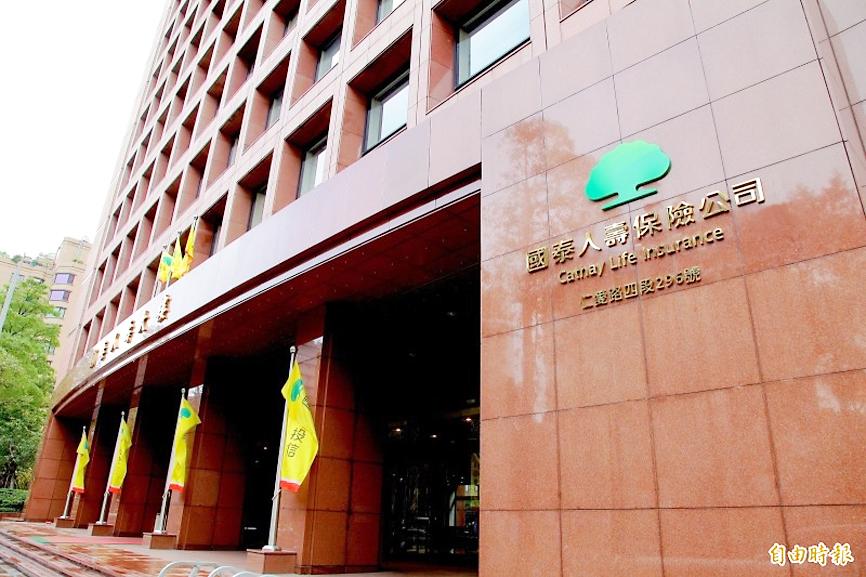Cathay Life Insurance Co (國泰人壽) yesterday reported a recurring yield of 3.29 percent as of the end of September, down from 3.8 percent a year earlier, as it takes a more cautious investment strategy amid the COVID-19 pandemic.
Recurring yield is a financial measure that shows how much a company earns from its investment on a regular basis.
Cathay Life registered recurring yields from a range between 3.47 and 3.8 percent during the January-to-September period over the past four years, company data showed.

Photo: Allen Wu, Taipei Times
Cathay Life was more proactive in taking advantage of the market volatility to sell stocks and secure capital gains than it was in the past few years, as it predicted that companies would distribute less cash dividends amid the pandemic, executive vice president Lin Chao-ting (林昭廷) told an investors’ conference in Taipei.
“We did not want to hold stocks just to get the dividends while losing the opportunity to earn the spread,” Lin said.
As the life insurer sold more stocks, it earned cash dividends of NT$16.2 billion (US$562.30 million) as of the end of September, down 34 percent from a year earlier, which trimmed its recurring yield by 16 basis points, he said.
Cathay Life preferred investment targets with higher credit ratings to avoid risks and disposed of those with ratings lower than triple B, which also reduced its recurring yield by 6 basis points, Lin said.
“Now we concentrate on those with ratings of triple B and A, while those with ratings of double B or lower only made up 1.6 percent of our investment portfolio, from 4.2 percent a year earlier,” Lin said.
A lower interest rate environment was also responsible for the drop in its recurring yield, he said.
Despite the lower recurring yield, Cathay Life booked capital gains of NT$112.7 billion for the first nine months of this year, which hit a record high and boosted the insurer’s cumulative net profit to a new high of NT$44.8 billion over the period.
Cathay Life said it would decide whether to raise its stake in Indonesia’s Bank Mayapada Internasional Tbk PT from 37.33 percent to 51 percent by the end of this year, after it in August booked an investment loss of NT$8.8 billion due to concerns about the lender’s operations amid a corporate scandal.

UNCERTAINTY: Innolux activated a stringent supply chain management mechanism, as it did during the COVID-19 pandemic, to ensure optimal inventory levels for customers Flat-panel display makers AUO Corp (友達) and Innolux Corp (群創) yesterday said that about 12 to 20 percent of their display business is at risk of potential US tariffs and that they would relocate production or shipment destinations to mitigate the levies’ effects. US tariffs would have a direct impact of US$200 million on AUO’s revenue, company chairman Paul Peng (彭雙浪) told reporters on the sidelines of the Touch Taiwan trade show in Taipei yesterday. That would make up about 12 percent of the company’s overall revenue. To cope with the tariff uncertainty, AUO plans to allocate its production to manufacturing facilities in

Taiwan will prioritize the development of silicon photonics by taking advantage of its strength in the semiconductor industry to build another shield to protect the local economy, National Development Council (NDC) Minister Paul Liu (劉鏡清) said yesterday. Speaking at a meeting of the legislature’s Economics Committee, Liu said Taiwan already has the artificial intelligence (AI) industry as a shield, after the semiconductor industry, to safeguard the country, and is looking at new unique fields to build more economic shields. While Taiwan will further strengthen its existing shields, over the longer term, the country is determined to focus on such potential segments as

TAKING STOCK: A Taiwanese cookware firm in Vietnam urged customers to assess inventory or place orders early so shipments can reach the US while tariffs are paused Taiwanese businesses in Vietnam are exploring alternatives after the White House imposed a 46 percent import duty on Vietnamese goods, following US President Donald Trump’s announcement of “reciprocal” tariffs on the US’ trading partners. Lo Shih-liang (羅世良), chairman of Brico Industry Co (裕茂工業), a Taiwanese company that manufactures cast iron cookware and stove components in Vietnam, said that more than 40 percent of his business was tied to the US market, describing the constant US policy shifts as an emotional roller coaster. “I work during the day and stay up all night watching the news. I’ve been following US news until 3am

COLLABORATION: Given Taiwan’s key position in global supply chains, the US firm is discussing strategies with local partners and clients to deal with global uncertainties Advanced Micro Devices Inc (AMD) yesterday said it is meeting with local ecosystem partners, including Taiwan Semiconductor Manufacturing Co (TSMC, 台積電), to discuss strategies, including long-term manufacturing, to navigate uncertainties such as US tariffs, as Taiwan occupies an important position in global supply chains. AMD chief executive officer Lisa Su (蘇姿丰) told reporters that Taiwan is an important part of the chip designer’s ecosystem and she is discussing with partners and customers in Taiwan to forge strong collaborations on different areas during this critical period. AMD has just become the first artificial-intelligence (AI) server chip customer of TSMC to utilize its advanced